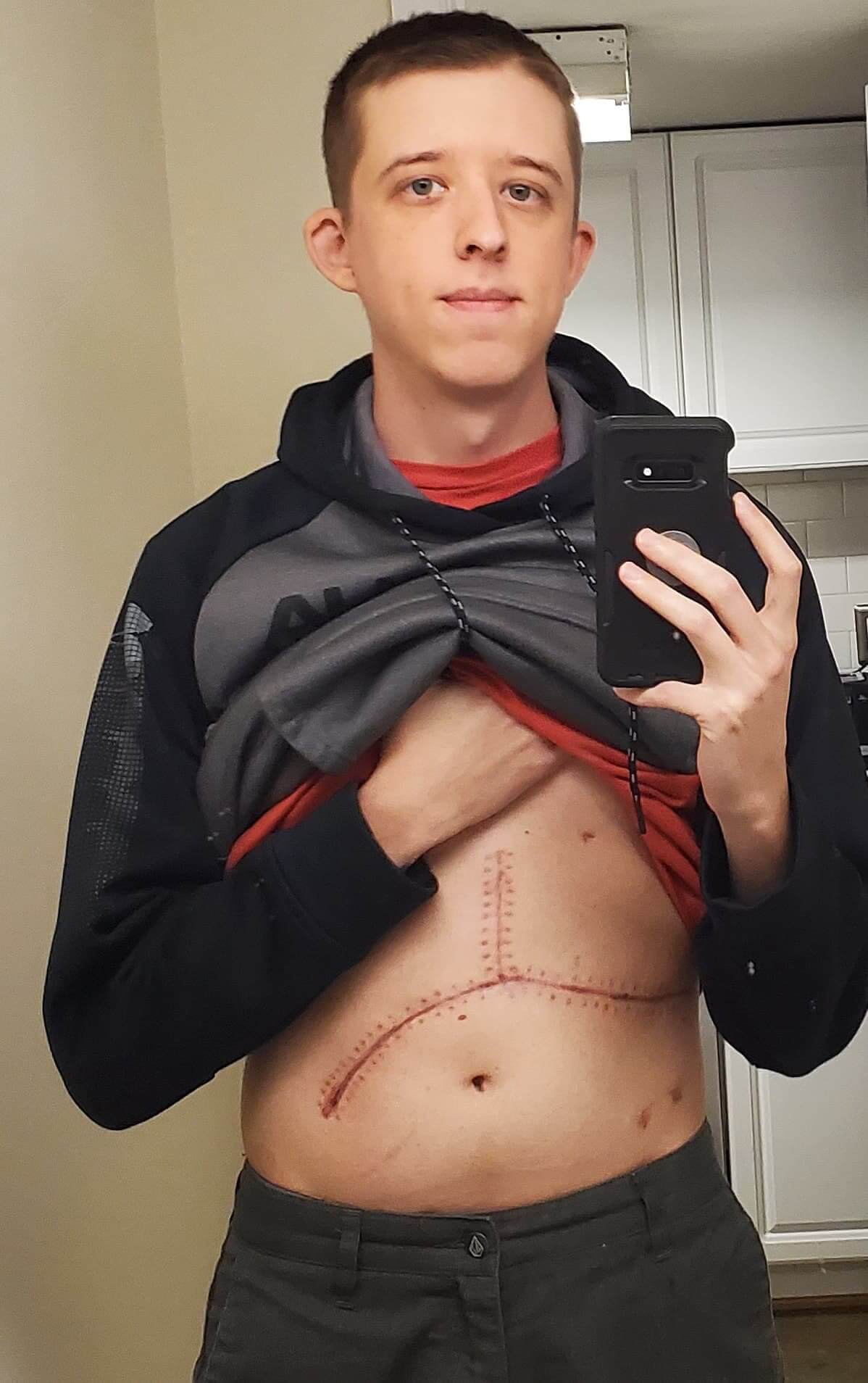
Only weeks after a life-saving liver transplant, Landon McKee reveals his recovering scar. Contributed photo.
Wilson’s disease affects more than 20,000 people each year
RICHMOND – Bad news wasn’t what he wanted, but it’s what he received.
In the summer of 2017, Danville native Landon McKee got shocking results from a blood test. At only 23-years-old, the college senior at Campbell University, located in Buies Creek, North Carolina, learned of a medical problem with his liver.
The medical results were particularly concerning because of the student’s family history. McKee’s father, who also experienced liver issues, had recently passed away.
At first, doctors told McKee he likely had a disorder known as auto-immune hepatitis. He started taking medication, but his symptoms did not improve. After a few months, his health took a turn for the worse.
In February 2018, McKee admitted himself to the emergency room, where doctors reevaluated his condition. They discovered the patient wasn’t suffering from an auto-immune disorder, but something quite rare.
An uncommon medical diagnosis
“I received a diagnosis of Wilson disease, a condition where the body cannot get rid of copper,” McKee said. “Copper is actually in a lot of food and it slowly can build up to enough to destroy the liver – the brain as well, but luckily I never experienced any brain damage.”
The disease occurs in approximately one in 30,000 to 40,000 people worldwide. An inherited defect in the ATP7B gene causes the issue. Wilson or Wilson’s disease is an autosomal recessive disorder, meaning that both parents must pass on the same abnormal gene to their child.
“I started treatment for it and I was told that without it, I wouldn’t probably make it another year,” McKee said.
He also got on the wait list for a liver transplant in May 2018 – an option that didn’t exist 60 years ago. Dr. Thomas Starzl performed the world’s first liver transplant in 1963 and the world’s first successful liver transplant in 1967.
Starzl went on to perfect the transplant process over the following years. Now, liver transplants are the second-most common transplant surgeries in the United States.
“The hardest part about waiting was just not knowing how long it would be,” McKee said. “I’ve heard of some people waiting years and some only months.”
The call comes
For roughly two years, McKee waited for the call that would change his life. In June 2020, in the midst of the COVID-19 pandemic, his phone rang. However, McKee’s end of the line wasn’t full of celebration – rather, humble contemplation.
“I was shocked. I did not think my call would come that soon,” McKee said. “Honestly, I was so heartbroken in the moment when I learned the gentlemen whose liver I would receive was around my age, in his 20s.”
With the possibility of a medical transplant occurring more quickly than the 26-year-old expected, his mind raced.
“I was also scared because there is always a chance that something might go wrong in surgery, or the liver might not be suitable or healthy enough to work anymore, in which case I’d be sent back home,” McKee said.
Thankfully, the surgery went successfully and the liver proved viable. Then came the recovery process, which wasn’t what most patients might consider standard, due to the pandemic.
“My recovery has mostly went well. There is a lot of pain to get through the first month, especially,” McKee said. “The hardest part of recovery was honestly dealing with hospital restrictions of visitors. I had absolutely no visitors due to restrictions. I was glad to be kept safe though, because COVID is especially dangerous for people with transplants.”
The start of a second chance
In the weeks since, McKee returned to work as a software developer at General Dynamics Information Technology in Richmond. He also celebrated his 27th birthday.
With his whole life now ahead of him, McKee said he looks forward to traveling and going to concerts once he fully recovers and the world returns to normal.
As he embarks on his second chance at life, McKee will always remember the selfless act of his anonymous medical donor.
“I don’t know their name; only ‘20-something-year-old male,’” McKee said. “I wrote a letter to the family sending my condolences and thanking them. I would tell them that their donation is the best gift I’ve ever received.”
A selfless choice
Lara Malbon, executive director of Donate Life Virginia, noted that the nonprofit organization manages the state’s registry for organ, eye and tissue donation.
“Organ donation is important because it saves lives,” Malbon said. “Right now, 2,400 Virginians are waiting for a life-saving organ transplant. One person can save up to eight lives and help 75 others through tissue donation.”
Founded in 1992 in Richmond, Donate Life America, the parent company of the Virginia organization, noted that 95% of Americans are in favor of being a donor, but only 58% are registered.
Some of the gap, Malbon suggested, could come from medical misinformation and misconceptions.
“Some people feel that they won’t be saved in the hospital if the hospital learns that they’re a registered organ donor. Nothing could be further from the truth. When you’re in the hospital, those professionals do everything they can to save your life,” Malbon said. “When everything has been done, that is when organ donation is thought of.”
Another misconception is that donors must die before giving part of their bodies to another individual. That’s not necessarily the case.
“You can also be a living donor. You can donate a kidney or a lobe of your liver,” Malbon said. “To be considered for that, you would need to contact the transplant center near you. Contact them, and they would begin the screening process.”
Becoming an organ donor
While Virginia considers registration on the donor list first-person consent and honors the wishes of the deceased, the executive director also encouraged those considering organ donation to talk with their loved ones about their decision.
“We also want people to have a conversation with their family and let their family members know that this is what they wanted,” Malbon said.
For those interested in becoming an organ donor, individuals may indicate their wishes on their driver’s license through the Virginia Department of Motor Vehicles. They may also register online at www.DonateLifeVirginia.org
“We think there’s no greater reward than saving lives,” Malbon said.
Support Our Cause
Thank you for taking the time to read our work. Before you go, we hope you'll consider supporting our values-driven journalism, which has always strived to make clear what's really at stake for Virginians and our future.
Since day one, our goal here at Dogwood has always been to empower people across the commonwealth with fact-based news and information. We believe that when people are armed with knowledge about what's happening in their local, state, and federal governments—including who is working on their behalf and who is actively trying to block efforts aimed at improving the daily lives of Virginia families—they will be inspired to become civically engaged.


VIDEO: Your support matters!
Your support matters! Donate today. @vadogwoodnews Your support matters! Visit our link in bio to donate today. #virginianews #virginia #community...

Op-Ed: Virginia’s new Democratic majorities pass key bills to improve your lives, but will Youngkin sign them?
The 2024 Virginia General Assembly regular session has wrapped up. It was a peculiar session from the outset, with Democratic majorities in the...

Op-Ed: Why Virginia Needs A Constitutional Amendment Protecting Reproductive Freedom
Virginia’s recent election season in 2023 drew in eyes from all over the country. Reproductive freedom was on the line and Virginia remained the...

From the state rock to the state flower, here’s how Virginia got its symbols
Have you ever wondered why the Dogwood is the state flower? Or how the cardinal became the state bird? We’re here to answer those questions and more...

VIDEO: Second-gentleman Douglas Emhoff gives speech on reproductive freedom
Second gentleman, Douglas Emhoff touched on reproductive freedom not only being a woman's issue but "an everyone's issue" during the Biden-Harris...

Glenn Youngkin and the terrible, horrible, no good, very bad night
Election Day 2023 has come and gone, and while there are votes to be counted, one thing is perfectly clear: Virginians unequivocally rejected Gov....





